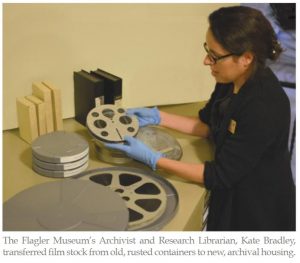by Karen Duhamel

Kate Bradley, Archivist and Research Librarian of Palm Beach, Florida’s Flagler Museum, came to cultural heritage, archives, and her current position through what she calls a “weird series of events” driven by a lifelong love of learning about history. These events included the pursuit of a Bachelor of Arts in History and French from Skidmore College, a Master of Library and Information Science and a Master of Arts in History, both from Simmons College, as well as a stint as Director of Engagement and Special Collections for the Calvin Coolidge Memorial Foundation.
Her experience with outreach and advocacy, however, has been much more straightforward. As Director of Engagement and Special Collections, Bradley worked to fundraise for the organization, as well as plan programs and activities, honing skills which she brought with her to the Flagler, where outreach and advocacy are more complicated. Unlike those of the Calvin Coolidge Memorial Foundation, the Flagler Museum Archives are closed to the public, finding aids are not shared, and none of the collection is online, limiting Bradley’s interactions with the public. Also complicating matters is the fact that museum has not prioritized outreach in the past.
“It’s hard,” she says, “when the institution in question hasn’t done much in the past. You’re basically building it from scratch, and you might experience some pushback.” Not to be discouraged, she advises “you have to understand that pushback, where they’re coming from and how to work through that to get to a point where you are bringing archives out more and showing it to more people and just getting more people interested in it.” Bradley does this in a number of ways, promoting the archives to parties both inside and outside of the museum, starting with the fielding of traditional research questions and an expansion of the museum’s use of social media.
Beyond those questions and social media posts, Bradley starts with the museum’s docents. As part of their training, Bradley introduces docents to the archives and talks with them about the collections she keeps secreted away, explaining how the collections are and can be used. By keeping the docents informed, Bradley makes sure that they “better understand their roles” and are capable of sharing their knowledge of the archives and relevant history with museum visitors during tours.
A second critical group of stakeholders that Bradley targets within the internal structure of the institution is the museum members, which she does through the museum’s quarterly membership magazine. In each issue of this magazine, entitled Inside Whitehall, Bradley includes an article relating to the archives. These articles, which might be about a unique item that was found in the collection or about a research project that was undertaken to answer a research question or to help create an exhibit, allow members to see behind the curtain, as it were, and understand how their donations are put to use by the archives, and thus (hopefully) justifying the archives existence in the minds of members.
Bradley also does important work to help students understand what her archives, and archives in general, have to offer. Firstly, at the Flagler, she meets with groups of visiting schoolchildren and explains what primary sources are and how to use them. Secondly, Bradley works outside of the museum by taking part in National History Day. In the past, she has used her expertise in historical and archival methods to serve as a judge at the state and county levels of students’ historical works such as documentaries and papers, though she was unable to partake in this year’s programming. Her involvement with National History Day allows her to share her “skills as an archivist and history professional to help these students grow in their own fields and understanding.”
The final outreach project that Bradley discussed was one has allowed her to bring items from the archives to the museum floor. In order to draw further attention to unique items in the collections, beyond what Bradley has been able to articulate in her Inside Whitehall articles, she has worked to create so-called “pop-up exhibits” or “spotlight cases” within the museum proper. These exhibits are small, thematic, and temporary (the current exhibits about Presidents Day and Valentine’s Day run through the first half of March), and are designed to “highlight pieces from [the] archival collection that really have never been seen before.” It’s “really nice,” she says “because we’ve really been able to bring some stuff out that I think is awesome but nobody ever gets the chance to see.”
For more information on the Flagler Museum, visit https://www.flaglermuseum.us/. Also see the NEH 50 States of Preservation article on the museum at http://bit.ly/2kMtlNd. To learn more about National History Day, visit https://www.nhd.org/.
